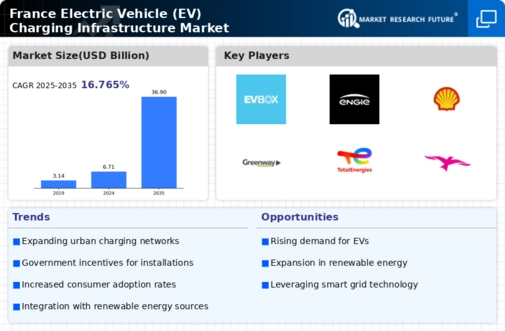Market Growth Projections
The Global France Electric Vehicle EV Charging Infrastructure Market Industry is projected to experience substantial growth in the coming years. The market is expected to reach a value of 2.5 USD Billion in 2024 and is forecasted to escalate to 12 USD Billion by 2035. This growth trajectory indicates a compound annual growth rate of 15.33% from 2025 to 2035. Such projections reflect the increasing adoption of electric vehicles and the corresponding need for robust charging infrastructure. The anticipated expansion underscores the importance of strategic investments and policy support to facilitate this growth.
Rising Environmental Awareness
Increasing environmental awareness among consumers is a pivotal driver for the Global France Electric Vehicle EV Charging Infrastructure Market Industry. As climate change concerns escalate, more individuals and businesses are gravitating towards sustainable transportation solutions. This shift is evidenced by the growing number of electric vehicles on French roads, which necessitates an expanded charging network. The French government aims to have 1.2 million charging points by 2030, indicating a strong commitment to enhancing infrastructure. Such initiatives not only support the transition to electric mobility but also align with global sustainability goals, further propelling market growth.
Government Incentives and Policies
The Global France Electric Vehicle EV Charging Infrastructure Market Industry is significantly influenced by government incentives and policies aimed at promoting electric vehicle adoption. The French government has implemented various subsidies and tax benefits for EV buyers, which in turn drives the demand for charging infrastructure. For instance, initiatives like the 'Bonus Ecologique' provide financial support to consumers purchasing electric vehicles. This policy framework is expected to bolster the market, contributing to an estimated growth from 2.5 USD Billion in 2024 to 12 USD Billion by 2035, reflecting a robust CAGR of 15.33% from 2025 to 2035.
Corporate Sustainability Initiatives
Corporate sustainability initiatives are emerging as a significant driver within the Global France Electric Vehicle EV Charging Infrastructure Market Industry. Many companies are committing to reducing their carbon footprints by transitioning their fleets to electric vehicles. This shift necessitates the establishment of adequate charging infrastructure to support corporate EV adoption. For instance, major corporations are investing in their own charging stations to facilitate employee use and promote sustainable practices. As more businesses recognize the importance of sustainability, the demand for charging infrastructure is likely to surge, further contributing to the market's anticipated growth.
Expansion of Electric Vehicle Models
The expansion of electric vehicle models available in the market is a crucial driver for the Global France Electric Vehicle EV Charging Infrastructure Market Industry. As automakers introduce a wider range of electric vehicles, including affordable options, the consumer base is likely to broaden. This diversification encourages more individuals to consider electric vehicles as viable alternatives to traditional combustion engines. Consequently, the demand for charging infrastructure is expected to rise in tandem with the increasing number of EVs on the road. This trend is anticipated to contribute to the market's growth trajectory, supporting the forecasted increase to 12 USD Billion by 2035.
Technological Advancements in Charging Solutions
Technological advancements in charging solutions are reshaping the Global France Electric Vehicle EV Charging Infrastructure Market Industry. Innovations such as ultra-fast charging stations and smart grid technologies are enhancing the efficiency and accessibility of EV charging. For example, the deployment of 350 kW charging stations allows for rapid charging, significantly reducing downtime for EV users. This technological evolution is likely to attract more consumers to electric vehicles, thereby increasing the demand for charging infrastructure. As these technologies continue to evolve, they may play a crucial role in meeting the projected market value of 12 USD Billion by 2035.






















Leave a Comment